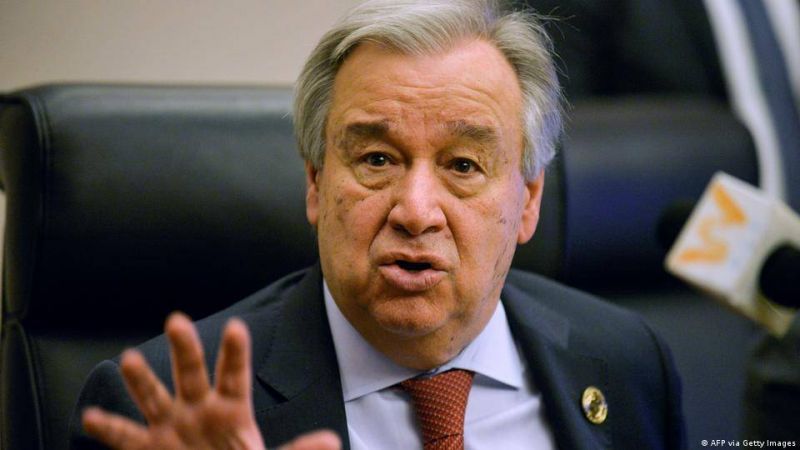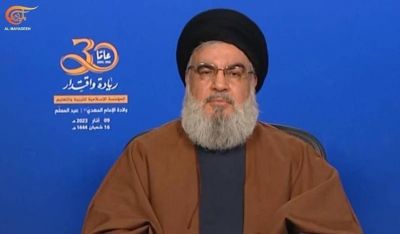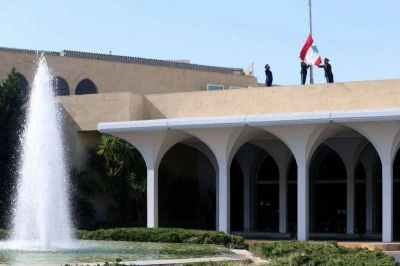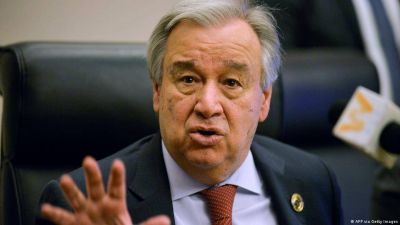
UN Secretary-General Antonio Guterres. (Credit: File photo AFP/Getty Images)
BEIRUT — In his new report on the implementation of UN Security Council resolution 1701 (2006), United Nations Secretary-General Antonio Guterres "notes with concern" Lebanon's presidential vacuum that has now entered its fifth month as the country's government continues to serve in a caretaker capacity.
"This situation undermines the country's ability to address its urgent socio-economic, security, financial, institutional and humanitarian challenges" he said. The UN chief called "on all stakeholders to show leadership and flexibility by intensifying their efforts to reach a consensus in the interest of Lebanese citizens."
This new quarterly report provides a comprehensive assessment of the implementation of 1701 covering the period from Nov. 3, 2022 to Feb. 20, 2023. It will be the subject of closed UN Security Council consultations scheduled for Thursday, March 16.
At these consultations, the Security Council will hear a detailed presentation by UN Special Coordinator for Lebanon Joanna Wronecka on the resolution's implementation since the previous report of Nov. 15 2022, including the provisions of resolution 2650 (2022). One key finding in the UN report was that "there has been no progress towards a permanent ceasefire between Lebanon and Israel."
The report is broken down into the following sections: implementation of resolution 1701; the situation in the area of operations of the United Nations Interim Force in Lebanon (UNIFIL); security and liaison arrangements; disarmament of armed groups; the arms embargo and border control; landmines and cluster bombs, border demarcation; political and institutional stability; security and safety measures; deployment of UNIFIL; conduct and discipline; and observations.
Political and institutional stability
The UN secretary-general detailed the overall deleterious conditions in Lebanon — political, institutional, socio-economic, financial, judicial, educational and health conditions — highlighting all the major shortcomings regarding the country's political and institutional stability.
Guterres deplored that "11 months after the agreement at the staff level of the International Monetary Fund (IMF), the country has still not put in place a financial program with this institution that will help stabilize the economy and introduce the necessary budgetary, financial, sectoral and governance reforms that meet the needs and aspirations of the Lebanese people." He called on all stakeholders to work with the interim government to avoid paralysis and dysfunction, to ensure the effective functioning of state institutions and to facilitate decision-making on urgent and critical issues.
Regarding Lebanon's critical socio-economic situation, which continues to deteriorate, Guterres noted with "concern" that the capacity of state institutions to deliver basic public services, including in key sectors such as water, energy, education and health, is diminishing.
"Lebanon's public institutions need coherent and urgent support to enable the country to get back on the development track and advance the implementation of the 2030 Agenda," he said.
Acknowledging that a long-term sustainable solution "lies solely with the Lebanese leadership," the UN chief called on that leadership to "take responsibility for the underlying causes of the crisis and address them decisively."
Unauthorized arsenal: 'a serious and persistent violation'
As in all of his reports, the secretary-general once again emphasized that "the maintenance by Hezbollah and other non-state armed groups of unauthorized weapons outside the control of the state represents a serious and persistent violation of resolution 1701."
He called on the Lebanese government to take the necessary steps to ensure that there are no weapons or authority in Lebanon other than those of the Lebanese state, including through the full implementation of the relevant provisions of the Taif Agreement and resolutions 1559 (2004) and 1680 (2006), which require the disarmament of all armed groups in Lebanon.
Guterres reiterated his call for the outstanding elements of Resolution 1701 and the issue of the national defense strategy to be addressed "through a national dialogue" and he "encouraged relevant actors in Lebanon to redouble their efforts to achieve this goal."
Beirut port explosion investigation: 'persistent and worrying delays'
Stressing the need to strengthen "an independent judiciary capable of delivering justice," Guterres expressed concern over "persistent delays" in the investigation of the Aug. 4, 2020 explosion at the Beirut port.
"The Lebanese authorities must put the interests of the victims first and carry out an impartial, thorough and transparent investigation," he said. He added that the same must go for the investigation into the murder of the intellectual and Hezbollah opponent Lokman Slim, which "is not progressing," and also asked that the investigation into the Tayyouneh clashes (between Hezbollah and Amal on one side and gunmen allegedly affiliated with the Lebanese Forces on the other, in Beirut in October 2021) also be advanced.
UNIFIL: presence of weapons, incidents and posturing
On the other hand, detailing the many incidents and violations that occurred during this period, the UN chief stresses his "grave concern" by the continuing acts of intimidation against peacekeepers, condemning once again in the "strongest terms" the attack against UNIFIL in al-Aaqbiya in December 2022, which cost the life of an Irish UN soldier, stressing "the need to bring to justice the perpetrators of this act."
He warned against incidents affecting UNIFIL's freedom of movement. He also plead for the Lebanese authorities to help dispel misconceptions and increase local communities' understanding of the mission's mandate, including its freedom of movement, both with the Lebanese Army and independently. "Misperceptions can fuel fear and suspicion of the mission, jeopardize the safety of personnel and reduce the operational space of peacekeepers," he said.
Furthermore, the secretary-general expressed his "disappointment at the return of disturbing incidents and posturing," including between the Lebanese Army and the Israeli militaty, which he said "could lead to escalation with serious consequences." He also condemned all continued Israeli violations of Lebanese airspace by Israeli aircraft and drones, which constitute a violation of Resolution 1701 and Lebanese sovereignty.
Guterres finally noted the importance of cooperation between UNIFIL and the Lebanese Army for the successful implementation of resolution 1701. However, some challenges remain.
"The Lebanese Army continues to face resource constraints, affecting its operational capabilities, in a context of financial economic crisis, which hinders progress in the strategic dialogue with UNIFIL aimed at increasing deployments and extending the authority of the state. In this regard, the launch of the Emergency Financial Support Facility is welcome. It will help support the two state security institutions in the short term and contribute to security and stability throughout the Lebanese state," he concluded.


